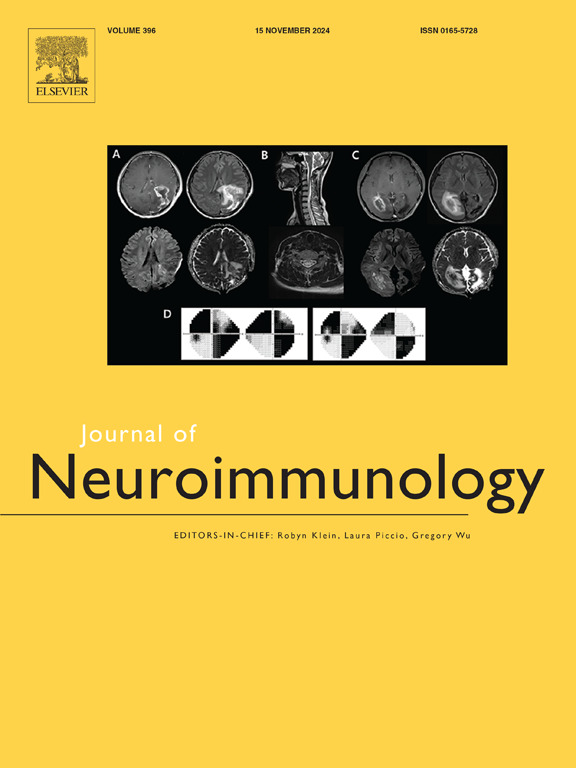Identification of shared pathophysiological molecules of major psychiatric disorders: A comprehensive analysis of serum immune complex antigens before and after electroconvulsive therapy
IF 2.9
4区 医学
Q3 IMMUNOLOGY
引用次数: 0
Abstract
Recent studies indicate common inflammatory findings have been identified in peripheral blood in patients with major psychiatric disorders, including schizophrenia (SCZ), bipolar disorder (BD), and major depressive disorder (MDD). Electroconvulsive therapy (ECT) frequently improves both severe symptoms and inflammatory markers in these conditions. However, the shared inflammatory mechanisms underlying these disorders, and thus, reliable biomarkers remain unclear. We hypothesized that the activation of immune complexes (ICs) contributes to inflammatory pathogenesis of these disorders. Using immune complexome analysis, we examined antigens forming ICs (IC-antigens) in the serum of patients with SCZ, BD, and MDD (n = 60) before and after ECT. Our analysis showed that although the overall quantity of ICs did not change before and after ECT, four proteins significantly decreased following ECT. These proteins were DENN domain-containing protein 1C (DENND1C), double-stranded RNA-specific editase 1 (ADARB1), perilipin-4, and coagulation factor XI, which were all consistently detected as IC-antigens across patient groups. Notably, DENND1C, ADARB1, and perilipin-4 were specific to psychiatric patients and absent in healthy controls. The abundance of these IC-antigens significantly correlated with psychiatric symptom scores, with DENND1C showing a particularly strong correlation with total symptom scores across all three disorders. These findings suggest that DENND1C may contribute to the shared pathophysiology of SCZ, BD, and MDD through antigenization or IC formation. This highlights its potential as a biomarker for ECT treatment availability and diagnostic/treatment efficacy monitoring.
鉴定主要精神疾病的共同病理生理分子:电休克治疗前后血清免疫复合物抗原的综合分析
最近的研究表明,在包括精神分裂症(SCZ)、双相情感障碍(BD)和重度抑郁症(MDD)在内的严重精神障碍患者的外周血中发现了常见的炎症。电休克疗法(ECT)经常改善这些疾病的严重症状和炎症标志物。然而,这些疾病背后的共同炎症机制,因此,可靠的生物标志物仍不清楚。我们假设免疫复合物(ic)的激活有助于这些疾病的炎症发病机制。利用免疫复合物分析,我们检测了60例SCZ、BD和MDD患者ECT前后血清中形成ic (ic抗原)的抗原。我们的分析显示,尽管在ECT前后ic的总数量没有变化,但ECT后有四种蛋白明显减少。这些蛋白是DENN结构域蛋白1C (DENND1C)、双链rna特异性编辑酶1 (ADARB1)、perilipin-4和凝血因子XI,它们在不同患者组中都被一致检测为ic抗原。值得注意的是,DENND1C、ADARB1和perilipin-4是精神病患者特有的,而在健康对照中不存在。这些ic抗原的丰度与精神症状评分显著相关,DENND1C与所有三种疾病的总症状评分相关性特别强。这些发现表明,DENND1C可能通过抗原化或IC形成参与SCZ、BD和MDD的共同病理生理。这突出了它作为ECT治疗可用性和诊断/治疗疗效监测的生物标志物的潜力。
本文章由计算机程序翻译,如有差异,请以英文原文为准。
求助全文
约1分钟内获得全文
求助全文
来源期刊

Journal of neuroimmunology
医学-免疫学
CiteScore
6.10
自引率
3.00%
发文量
154
审稿时长
37 days
期刊介绍:
The Journal of Neuroimmunology affords a forum for the publication of works applying immunologic methodology to the furtherance of the neurological sciences. Studies on all branches of the neurosciences, particularly fundamental and applied neurobiology, neurology, neuropathology, neurochemistry, neurovirology, neuroendocrinology, neuromuscular research, neuropharmacology and psychology, which involve either immunologic methodology (e.g. immunocytochemistry) or fundamental immunology (e.g. antibody and lymphocyte assays), are considered for publication.
 求助内容:
求助内容: 应助结果提醒方式:
应助结果提醒方式:


